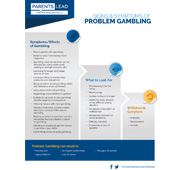Warning Signs Of Problem Gambling
- Warning Signs Of Problem Gambling
- Warning Signs Of Problem Gambling Without
- Warning Signs Of Problem Gambling Related
You think there might be signs of problem gambling brewing in your home. You’ve noticed one whose activity occurs behind closed doors or in secrecy. One whose consequences are starting to show up when money goes missing and bills aren’t being paid by your partner.
But you aren’t quite sure.
Or, maybe you’re worried about your child and where their lunch money is going every day. Influenced by television, movies and online, your child is bragging about new possessions and has a constant focus on “winning.”
Or, maybe you’re worried about excessive gambling of your own. How much is too much?

The causes of gambling addiction are relatively unknown, but like many problems, it appears to originate as a result of a combination of biological, genetic, and environmental factors. Compulsive gambling can impact both men and women equally, and knows no bounds as far as social, cultural, and socioeconomic factors are concerned. Problem gambling generally means gambling that involves more than one symptom but fewer than the at least five symptoms required to qualify for the diagnosis of compulsive or pathological gambling. Binge gambling is a subtype of compulsive gambling that involves problem gambling but only during discrete periods of time.
Problem gambling is a widespread issue faced by hundreds of thousands of New York residents every year. Nationwide, millions of people battle the addiction of gambling through common methods such as online gaming, lottery tickets and casino spending.
Like many addictions, gambling is not always recognized immediately, and the consequences often reach a staggering level before any attempts to control it are made.
Signs of Problem Gambling
We understand not everyone wants to ask for support, and diagnosing a gambling problem of your own or of someone else is stressful and can cause fear of embarrassment or shaming and labeling. While we strongly encourage you to seek help as soon as gambling activity seems questionable, understanding recognized warning signs of problem gambling may help you identify whether there is a problem and reinforce your decision to seek assistance.
Concerned about yourself?
When seeking to understand your own potential gambling problem, ask yourself the following questions:
- Do you gamble to escape worry, boredom or trouble?
- Do thoughts of gambling disrupt your sleep?
- Do arguments, disappointments or frustrations cause you to gamble?
- Have you ever had self-destructive thoughts because of problems resulting from gambling?
- Have you noticed a personality change since you began gambling?
Warning Signs Of Problem Gambling
Answering questions like these is a good first step in identifying your own gambling problem.


Concerned about others?
While you may not be the one gambling, you can observe changes in the personality and behavior of someone with a gambling addiction. Asking your child, loved one or coworkers questions such as the ones provided below:
- Does your loved one ever gamble longer than originally planned?
- Do you hide the rent/mortgage or food money because your loved one gambles it away?
- Is your child borrowing or stealing money?
- Does your child have an unusual interest in newspapers, magazines, periodicals and other outlets containing odds and scores?
- Does your employee or coworker spend an excessive time away from his or her job using the telephone to place bets or spending time reviewing formsheets, racing, sports or stock pages?
Ask the Right Questions – and Get Help
Provided above were just a few examples of the warning signs that may present themselves when a gambling problem exists. For a complete list of problem gambling warning signs, read Know The Odds’ Understanding Problem Gambling e-book. Section 04 provides an extensive list of questions to ask when identifying whether you, your loved one, your child or your coworker have a gambling problem.
If answering these questions leads you to believe a gambling addiction is present, seek immediate help. Visit the Gambling Support Directory to find counseling and support in a New York county near you, or reach out for help through the HOPEline today: 1-877-8-HOPENY.
Related Posts
Gambling addiction is a type of impulse-control disorder where you have little or no control over your urge to gamble, even when you are aware that your actions can hurt yourself and others and even when the odds are against you.
There is often an underlying issue which causes you to start gambling. Examples may include stress caused by problems at work, unresolved issues within a relationship, drug or alcohol addiction, or a form of escapism from bereavement or any difficult emotional period in your life.
At Priory, we understand that acknowledging you have a gambling problem and seeking help can be difficult at first. Whether you have lost a significant amount of money on one bet or over a period of time, your gambling addiction can be rectified no matter how severe your habit.
Our approach to treating gambling addiction symptoms involves psychological support or intervention therapy sessions using evidence-based approaches to initially help to understand the reasons why you have developed a gambling addiction, which can be further explored as part of individual or group therapy sessions at one of our specialist addiction treatment centres.
Feeling a constant urge to gamble even when you are already in a difficult financial situation, or gambling as a way out of financial difficulty are both common symptoms of a gambling addiction. Gambling addiction can also cause problems in relationships and at work, while the cost of funding a gambling addiction can become a huge burden as well as an emotional pressure.
Warning Signs Of Problem Gambling Without
Common symptoms of a gambling addiction
Warning Signs Of Problem Gambling Related
Gambling addiction may be caused by underlying stress linked to a difficult time in your life, whether work, relationship or financially related, as well as having an addictive personality prone to compulsive behaviour.